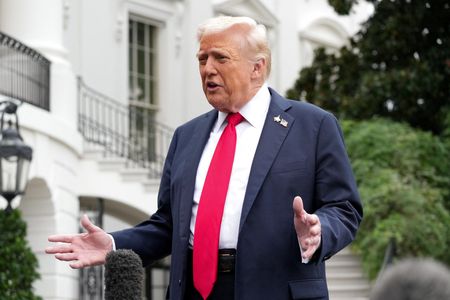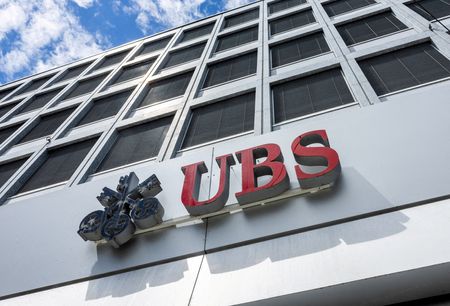By Ali Sawafta
RAMALLAH, West Bank (Reuters) -U.S. President Donald Trump’s Gaza peace plan outlines a blueprint for Palestinian statehood, but in the West Bank – where this vision would be realised – the economic prospects for a viable state are being strangled.
Transport corridors used by business have been fragmented by a network of Israeli settlements, employees of Palestinian institutions have not been paid as Israel blocks transfers of tax revenues, and the vital pillar of remittances from workers heading to Israel has all but dried up since the Gaza war began.
“We think twice before spending one shekel,” Rami Harfoosh said as his 13-year-old son, who wonders if he will ever attend university, looked on. He has not been able to afford to buy a replacement for his son’s hearing aid since losing the $1,700 monthly paycheck he used to receive working in Israel.
QUESTIONS OVER VIABILITY OF A PALESTINIAN STATE
Trump secured Israeli Prime Minister Benjamin Netanyahu’s backing on Monday for a U.S.-sponsored peace proposal to end nearly two years of war in Gaza, and there is growing international support for Palestinian statehood.
But peace in Gaza is not guaranteed – there are questions over whether Hamas will accept the plan and Trump said Israel can “do what you would have to do” if the Palestinian militant group rejects it.
A viable Palestinian state in Gaza and the West Bank, a separate territory that is currently occupied by Israel and lies between Israel and the western bank of the River Jordan, may also not be imminent.
The Palestinian Authority (PA), which exercises limited governance of areas where most of the Palestinian population lives, considers itself the sole representative of the Palestinian people.
But its credibility has been undermined by the impact of the Israeli fiscal squeeze, its own poor management of the economy, rapid Israeli settlement building on land Palestinians want for a state and a lack of political reforms.
“Persistent fiscal strains have drastically eroded the Palestinian Authority’s (PA) revenue base, placing extreme constraints on the financing of basic services,” said a World Bank report.
“If sustained, these dynamics have the potential to precipitate fiscal collapse.”
The PA has denied allegations of corruption and says Israel wages financial warfare to prevent the possibility of a viable Palestinian state. Israel did not immediately respond to a request for comment.
LOSS OF CONFIDENCE IN PALESTINIAN AUTHORITY
Like many Palestinians, Rami Thawlatin thinks little about the notion of a Palestinian state.
He made a decent living on a construction site in Israel for years but has struggled to support his family since work permits were halted after the Hamas-led attack on Israel October 7, 2023 that began the Gaza war.
These days he rarely finds enough work to support his family in the West Bank, borrowing money from his father and brothers.
Thawlatin says he cannot rely on the PA to fix the economy, create jobs or provide adequate health services.
“No one is familiar with us or assists us, not the Authority, not the labour union, and no one who is our leader,” he said.
The PA, which is led by President Mahmoud Abbas, has not held a parliamentary election in the West Bank since 2006 and some Palestinian officials say it is facing one of its gravest crises since it was created under interim peace deals with Israel 30 years ago.
ISRAEL WITHHOLDS FUNDS
Under a longstanding arrangement, Israel collects taxes on goods that pass through Israel into the West Bank and makes monthly transfers to authorities in the main city of Ramallah.
Since May, Israel’s finance ministry has withheld around 10 billion Shekels ($2.96 billion) in the funds it collects in taxes and duties on behalf of the PA, which is now cutting salaries and is unable to pay contractors.
After the Gaza war started, Israel’s far-right finance minister, Bezalel Smotrich, began withholding a portion of those revenues equal to the amount transferred by the PA to Gaza, where the Abbas-led administration has continued financing services, salaries and pensions despite Hamas’s takeover there. Smotrich says the funds would end up in Hamas’ hands.
Wael al-Sheikh, undersecretary of the Palestinian health ministry, said there were severe shortages of medicine, including oncology drugs and general surgery items.
“The situation is very critical,” he said.
Since October 2023, PA salary payments have been cut to about 70% of full wages, and further declined in mid-2025 following the suspension of clearance revenue transfers from Israel. In May 2025, salaries were paid at 60%. In June, payments dropped to 50%.
“We no longer have the ability to borrow from banks, all the internal technical solutions we have done, we have done everything in the matter of reducing expenses,” said Planning and International Cooperation Minister Estephan Salameh.
YOUNG PEOPLE UNCERTAIN ABOUT THE FUTURE
Israeli telecommunications companies have been moving into the territory, said Laith Daraghmeh, CEO of the Palestinian Telecommunications Regulatory Authority (TRA).
In 2025, 22 communication towers will be built with Israeli government financing near Jewish settlements, Daraghmeh said.
“But it is a direct directive to impact the Palestinian economy by reducing the number of users of (Palestinian) networks and creating the ‘digital divide’ that they are always seeking,” he said.
Some Palestinian areas have no telecommunications services at all, he said.
Younger generations worry about their prospects in the West Bank. Lina, 22, graduated with honours in English literature and business administration from the West Bank’s Birzeit University this year but could not find a paid job in Ramallah.
Last year she spent five months on an education trip in Germany.
“There I realised they can see a future, had plans. Here it is different. I don’t have a single friend who is not thinking of leaving,” she said.
(Additional reporting by Charlotte Greenfield; Writing by Michael Georgy, Editing by Timothy Heritage)












